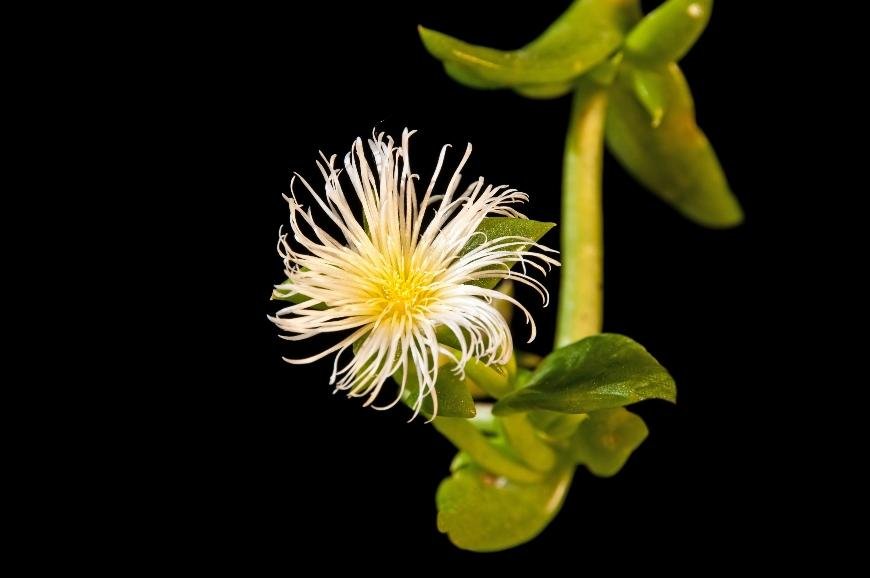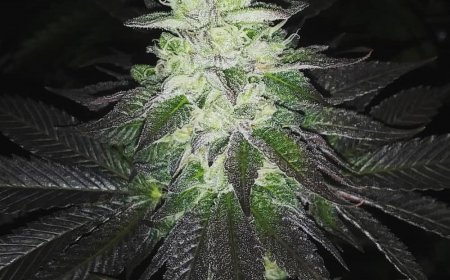What is Kanna?
In this blog post, we will delve deep into the history, traditional uses, and active compounds that make kanna such a unique substance.

What is kanna? This intriguing plant has piqued the interest of many young adults who are exploring the world of natural remedies and recreational substances. In this blog post, we will delve deep into the history, traditional uses, and active compounds that make kanna such a unique substance.
We'll also discuss kanna's effects on those taking it and uncover some potential side effects to be aware of. Furthermore, we'll examine whether or not kanna is safe for consumption and explore any possible interactions with other drugs you may encounter in your journey towards understanding this fascinating plant.
By the end, you'll be armed with insight into kanna and how it may affect your life. So let's embark on this exciting exploration together!
Table of Contents:
- What is Kanna?
- Traditional Uses of Kanna
- Active Compounds in Kanna
- Effects of Kanna Use
- Side Effects of Kanna Use
- Is Kanna Safe?
- Potential Interactions with Other Drugs
- Frequently Asked Questions What is Kanna
- Conclusion
What is Kanna?
Kanna, scientifically known as Sceletium tortuosum, is a succulent plant native to South Africa that has been used for centuries as an herbal remedy. The indigenous people of the region have long recognized kanna's effects on mood and well-being, often taking it to alleviate anxiety, depression, and stress-related conditions. Today, many young adults between 20 and 30 years old are becoming increasingly interested in exploring natural alternatives like kanna for recreational or therapeutic purposes.
The traditional method of taking kanna involves chewing the leaves or roots of the plant; however, modern users may also consume it in various forms such as capsules, teas, tinctures or even smoked. As interest in this ancient herb continues to grow worldwide due to its potential benefits on mental health and overall wellness.
Traditional Uses of Kanna
In South African cultures where kanna originates from, it was traditionally used by hunters who would chew on the leaves during long expeditions for increased energy levels and focus. Additionally,
- Anxiety relief: Many people report experiencing reduced feelings of anxiety after taking kanna due to its calming properties.
- Mood enhancement: Kanna effects include uplifting one's mood which can be helpful for those suffering from mild depression or simply seeking a more positive outlook.
- Pain relief: Some users claim that using kanna helps them manage pain related issues such as headaches or muscle tension with greater ease.
Active Compounds in Kanna
The primary active compounds responsible for kanna's effects are mesembrine, mesembrenone, and mesembrenol. These alkaloids work together to produce the plant's unique properties that many users find beneficial for relaxation and mood enhancement. Research is still being conducted to better understand how these alkaloids interact with our bodies, but it is speculated that they may act as natural serotonin reuptake inhibitors (SSRIs), similar to some prescribed antidepressants.
Though kanna may offer potential advantages for psychological well-being, it should not be seen as a substitute for professional medical guidance or care when managing major mental health issues.
Kanna, a centuries-old botanical remedy to boost mental clarity and quell stress, is still studied in the present day as an intriguing subject of research. Its traditional uses are now being explored in modern times, making it an exciting topic of exploration. Moving on, let's take a look at the traditional uses of Kanna.
The San and Khoikhoi Tribes: Early Users of Kanna
The San and Khoikhoi tribes were among the first to utilize kanna in their daily lives. They would chew on the leaves or roots to alleviate anxiety, depression, and stress-related conditions. It was also believed that taking kanna could help improve mood during social gatherings or spiritual rituals. The use of this versatile plant even extended to hunting expeditions, where hunters would consume it to increase energy levels and suppress hunger.
Kougoed: A Traditional Fermented Preparation
A popular traditional method of consuming kanna involved fermenting the leaves into a substance called kougoed. This process enhanced kanna effects while preserving its potency for an extended period. Kougoed was typically consumed by chewing small amounts before swallowing or brewing it into tea.
- Anxiety relief: One primary reason people have been taking kanna throughout history is due to its ability to reduce anxiety symptoms without causing significant sedation like many modern medications do.
- Mood enhancement: Many users report experiencing elevated moods after consuming kanna, making it a natural alternative for those struggling with mild-to-moderate depression.
- Stress reduction: Kanna's calming effects can help alleviate stress, promoting a sense of well-being and relaxation.
- Energizing properties: In addition to its relaxing effects, kanna is also known for increasing energy levels and alertness in users. Kanna can also be a great alternative for those looking to increase their productivity without resorting to stimulants like caffeine.
In recent years, the traditional uses of kanna have inspired modern research into its potential therapeutic applications. As more people become aware of this fascinating plant, it continues to gain popularity among those seeking natural alternatives for managing anxiety, depression, and other mental health concerns.
Kanna has a long history of traditional use, ranging from its effects on mood to medicinal applications. Researchers are now delving further into the active components of Kanna to better comprehend the potential advantages and hazards linked with this herb.

Active Compounds in Kanna
Kanna, scientifically known as Sceletium tortuosum, contains several active compounds that contribute to its effects on the human body. These compounds are responsible for kanna's mood-enhancing and stress-relieving properties, making it a popular choice among those seeking natural alternatives to traditional medications.
Mesembrine
The primary active compound found in kanna is mesembrine. This alkaloid has been shown to act as a serotonin reuptake inhibitor (SRI), which means it helps increase the levels of serotonin available in the brain by preventing its reabsorption into neurons. Serotonin, a neurotransmitter linked to regulating mood, appetite and sleep patterns, is impacted by mesembrine's action as an SRI. By increasing serotonin levels, mesembrine can help alleviate symptoms of depression and anxiety while promoting feelings of well-being and relaxation.
Mesembrenone & Mesembrenol
In addition to mesembrine, kanna also contains two other key alkaloids: mesembrenone and mesembrenol. Both these compounds have been found to possess similar SRI properties as mesembrine but with varying degrees of potency.
- Mesembrenone: This alkaloid acts not only as an SRI but also inhibits phosphodiesterase 4 (PDE4), an enzyme that breaks down cyclic adenosine monophosphate (cAMP). Elevated cAMP concentrations have been linked to better mental acuity and lessened inflammation.
- Mesembrenol: While less potent than mesembrine, mesembrenol still contributes to kanna's overall effects. It has been suggested that this compound may also play a role in the plant's mood-enhancing properties.
The active compounds in kanna interact synergistically, amplifying one another's effects and allowing for a natural means of managing stress, anxiety, and depression. However, it is important to note that more research is needed to fully understand the mechanisms behind these alkaloids' actions within the body.
Kanna contains several active compounds, including mesembrine and mesembrenone, which have been studied for their potential effects on the body. Further study is required to explore how the components of kanna interact and affect people when ingested. Moving forward, let's take a look at what kind of effects kanna use can produce in those who consume it.
Effects of Kanna Use
Kanna's effects can vary depending on the method of consumption, dosage, and individual factors. However, some common effects experienced by users include:
- Relaxation
- Euphoria
- Increase in energy and alertness
- Enhanced mood and emotional well-being
- Reduced anxiety and stress levels
- Research has shown that kanna may also have potential antidepressant properties.
Taking kanna in small doses typically results in a stimulating effect, while larger doses tend to produce more sedative-like sensations. This makes it an attractive option for those looking to manage their mood or combat fatigue throughout the day without resorting to traditional stimulants like caffeine.
The Role of Serotonin in Kanna's Effects
Serotonin is a neurotransmitter responsible for regulating various functions within the body such as mood, appetite, sleep patterns, and cognitive function. The active compounds found in kanna - mesembrine, mesembrenone, and mesembrenol - are believed to work by inhibiting serotonin reuptake. By doing so,
leading to enhanced feelings of well-being and happiness.
Different Methods of Consuming Kanna
Kanna can be consumed through various methods including:
- Note: These methods might result in different effects and durations.
- Chewing the leaves or roots
- Smoking dried kanna plant material
- Kanna extracts,
which can be consumed sublingually, snorted, or added to food and beverages
- Tinctures and teas made from kanna leaves or roots
Ultimately, users should experiment with different methods of ingestion and amounts to find what is best for them. Always start with a low dose when trying kanna for the first time and gradually increase as needed.
Kanna has been used for centuries as a natural remedy, and its effects are both calming and stimulating. Therefore, it is important to take caution when using kanna as there may be potential side effects associated with its use.

Side Effects of Kanna Use
Kanna, like any other substance, can cause side effects when used. It is essential to note the potential risks and downsides of kanna use, as well as the positive experiences many users report. Some common side effects include:
- Nausea
- Dizziness
- Headaches
- Dry mouth
Mild symptoms may come and go without treatment, but if they become persistent or severe while using kanna, it is best to stop taking it and speak with a doctor. If your symptoms remain or become more severe while taking kanna, it is wise to discontinue use and consult a doctor.
In addition to these common side effects, some individuals may also experience more serious adverse reactions when taking kanna. These can include increased heart rate or blood pressure and difficulty breathing. It is crucial for those with pre-existing medical conditions such as heart disease or respiratory issues to exercise caution when considering using kanna.
Allergic Reactions to Kanna Use
Rarely, some people may have an allergic reaction to kanna. Symptoms of an allergic reaction can range from mild skin irritation (such as rash or itching) to more severe reactions like swelling of the face or throat and difficulty breathing. If you suspect that you are experiencing an allergic reaction after taking kanna, seek immediate medical attention.
Long-term Safety Concerns: What We Know So Far
The long-term safety profile of regular kanna use remains relatively unknown due in part to limited research available on this plant-based supplement at present time; however preliminary studies suggest that kanna may be safe when used in moderation. It is always best to consult with a healthcare professional before incorporating any new supplement into your routine, especially if you have pre-existing medical conditions or are taking other medications.
The side effects of Kanna use are numerous and should be considered carefully before taking the substance. Despite the potential risks, it is essential to assess if kanna is a safe option before making any decisions regarding its consumption.
Is Kanna Safe?
When taken in moderation, kanna is generally considered safe for most people. However, there are certain individuals who should exercise caution or avoid taking kanna altogether. In this section, we will discuss the safety of kanna and any potential risks associated with its use.
Pregnant Women
Kanna should be avoided by pregnant women as there is not enough research to determine its safety during pregnancy. The effects of kanna on a developing fetus are unknown; therefore, it's best to err on the side of caution and refrain from using it while expecting.
Individuals with Medical Conditions
Before taking kanna, it's important to discuss potential risks with your healthcare provider if you have pre-existing medical conditions such as heart problems, high blood pressure, liver disease or kidney issues. Some compounds found in the plant may exacerbate these conditions or interact negatively with medications you're currently taking.
Mental Health Concerns
- Bipolar Disorder: Individuals diagnosed with bipolar disorder should avoid using kanna due to its mood-altering properties which can potentially trigger manic episodes.
- Anxiety Disorders: While some users report that kanna effects help alleviate anxiety symptoms, others find that it increases their feelings of anxiousness. If you suffer from an anxiety disorder and decide to try taking kanna for relief purposes, start at a low dose and monitor your reaction closely.
Kids & Adolescents
The long-term effects of regular consumption on children and adolescents' brain development are not well understood. Therefore, it is recommended that kanna be avoided by individuals under the age of 18.
Overall, while kanna may provide relief for certain conditions and symptoms, it's essential to consider your individual circumstances before taking kanna. If uncertain about whether kanna is appropriate for you or if any potential risks exist in its usage, it's recommended to consult a healthcare expert who can advise based on your particular requirements and medical background.
Overall, it is important to understand the potential risks of taking kanna and speak with a doctor or healthcare provider before using this substance. However, it is also essential to consider how other drugs may interact when consuming kanna in order to ensure safety and optimal effects.
Potential Interactions with Other Drugs
While kanna's effects can be beneficial for many people, it is essential to consider the potential interactions it may have with other medications. Combining kanna with certain drugs might lead to adverse reactions or diminish the effectiveness of your prescribed medication.
Kanna and Antidepressants
If you are taking antidepressant medications, particularly selective serotonin reuptake inhibitors (SSRIs) or monoamine oxidase inhibitors (MAOIs), exercise caution when considering taking kanna. Kanna has been found to act as a natural SSRI itself, so combining it with these types of medications could potentially cause a dangerous condition called serotonin syndrome. This occurs when there is too much serotonin in the body and can result in symptoms such as agitation, confusion, rapid heart rate, and high blood pressure. To learn more about SSRIs and their interaction with kanna, check out this informative article on Healthline.
Kanna and Antipsychotics
Those who take antipsychotic medications should also be cautious when using kanna. The combination of these two substances may increase the risk of experiencing side effects from both drugs or reduce their efficacy altogether. If you're currently on an antipsychotic medication regimen and interested in trying kanna for its therapeutic benefits, consult your healthcare provider before making any changes.
Talking to Your Doctor About Kanna Use
- Be honest: Inform your doctor about your interest in trying kanna alongside any current prescription medications you're taking.
- List all supplements: Make sure to mention any other supplements or herbal remedies you're using, as these could also interact with kanna.
- Ask for guidance: Your healthcare provider can help determine if taking kanna is safe for you and provide recommendations on dosage and frequency of use.
In conclusion, while many people enjoy the benefits of kanna without issue, it's crucial to be aware of potential interactions with other medications. Always consult your doctor before introducing new substances into your routine to ensure a safe and enjoyable experience.
Frequently Asked Questions What is Kanna
What is the description of Kanna?
Kanna, scientifically known as Sceletium tortuosum, is a succulent plant native to South Africa. It has been traditionally used for its mood-enhancing and stress-relieving properties. The plant contains alkaloids that interact with the brain's serotonin system, producing calming effects.
What type of drug is Kanna?
Kanna can be classified as an herbal supplement or natural psychoactive substance. It is not considered a controlled substance in most countries but may have legal restrictions depending on local regulations. Its primary effects are related to mood enhancement, relaxation, and mild stimulation.
What is inside Kanna?
The main active compounds found in Kanna are mesembrine, mesembrenone, mesembrenol, and tortuosamine. These alkaloids act as serotonin reuptake inhibitors (SRI) and phosphodiesterase 4 (PDE4) inhibitors which contribute to its mood-enhancing and anti-anxiety effects
Conclusion
In conclusion, kanna has been used traditionally for centuries as a calming and mood-elevating agent. It is known to contain active compounds that have effects on the body when ingested or smoked. It is important to be aware of the potential for interactions with other drugs before using kanna, given its traditional use as a calming and mood-elevating agent. Further exploration of the safety and effectiveness of kanna could enable us to optimize its utilization in our contemporary society.






































































































































